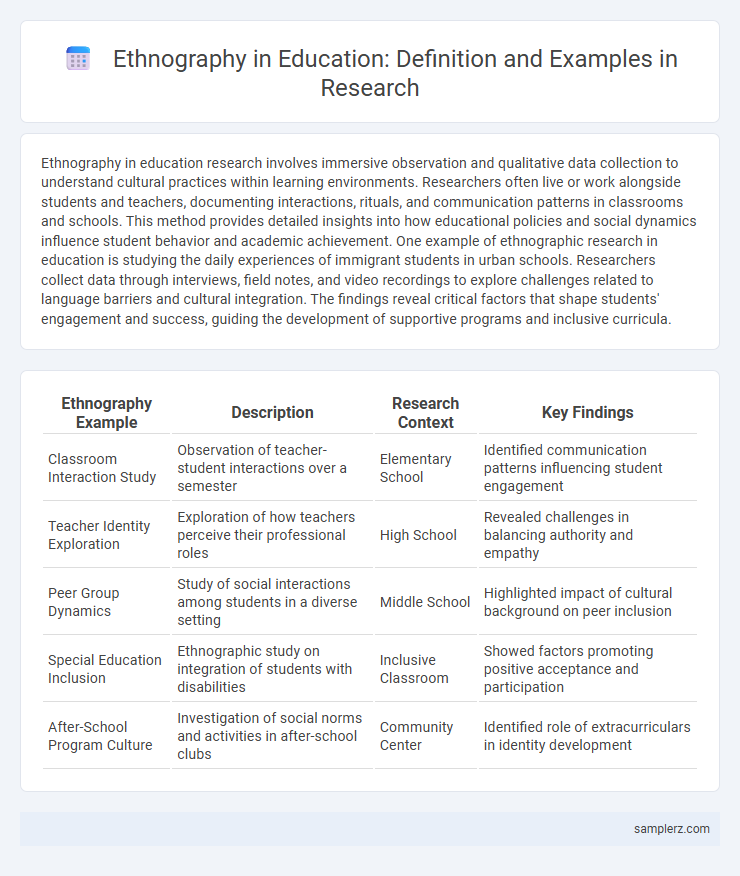Ethnography in education research involves immersive observation and qualitative data collection to understand cultural practices within learning environments. Researchers often live or work alongside students and teachers, documenting interactions, rituals, and communication patterns in classrooms and schools. This method provides detailed insights into how educational policies and social dynamics influence student behavior and academic achievement. One example of ethnographic research in education is studying the daily experiences of immigrant students in urban schools. Researchers collect data through interviews, field notes, and video recordings to explore challenges related to language barriers and cultural integration. The findings reveal critical factors that shape students' engagement and success, guiding the development of supportive programs and inclusive curricula.
Table of Comparison
| Ethnography Example | Description | Research Context | Key Findings |
|---|---|---|---|
| Classroom Interaction Study | Observation of teacher-student interactions over a semester | Elementary School | Identified communication patterns influencing student engagement |
| Teacher Identity Exploration | Exploration of how teachers perceive their professional roles | High School | Revealed challenges in balancing authority and empathy |
| Peer Group Dynamics | Study of social interactions among students in a diverse setting | Middle School | Highlighted impact of cultural background on peer inclusion |
| Special Education Inclusion | Ethnographic study on integration of students with disabilities | Inclusive Classroom | Showed factors promoting positive acceptance and participation |
| After-School Program Culture | Investigation of social norms and activities in after-school clubs | Community Center | Identified role of extracurriculars in identity development |
Understanding Ethnography in Educational Research
Ethnography in educational research involves immersive observation and qualitative analysis to understand classroom dynamics and cultural interactions among students and teachers. Researchers document behaviors, communication patterns, and social relationships within educational settings to reveal how identity, power, and learning processes influence outcomes. This methodology uncovers nuanced insights into student experiences and institutional practices that quantitative data alone may overlook.
Key Characteristics of Educational Ethnography
Educational ethnography involves immersive observation and detailed description of classroom interactions and cultural practices within learning environments. Key characteristics include participant observation, qualitative data collection such as interviews and field notes, and an emphasis on understanding students' and teachers' perspectives within their social and cultural contexts. This approach uncovers the complex dynamics of educational settings, highlighting how cultural norms and social relationships shape learning experiences.
Classroom Observation as Ethnographic Method
Classroom observation as an ethnographic method provides in-depth insights into student-teacher interactions, cultural dynamics, and learning behaviors within educational settings. Researchers systematically document naturalistic behaviors, communication patterns, and social norms to understand classroom culture and its impact on learning outcomes. This qualitative approach allows for rich, contextualized data crucial for developing effective pedagogical strategies and educational policies.
Ethnographic Study of Student-Teacher Interactions
Ethnographic studies of student-teacher interactions provide in-depth insights into classroom dynamics by observing communication patterns, cultural norms, and power relations within educational settings. Through qualitative methods such as participant observation and detailed field notes, researchers capture the nuanced behaviors and social context influencing learning processes. This approach reveals how cultural backgrounds and social identities shape engagement, participation, and instructional strategies in diverse classroom environments.
Exploring School Culture through Ethnography
Ethnographic research in education involves immersive observation and detailed documentation of interactions within a school setting to uncover the underlying values, beliefs, and practices that shape school culture. For example, a researcher might spend an entire academic year embedded in a high school to analyze how informal student groups, teacher collaborations, and administrative policies influence the learning environment. These qualitative insights reveal the complex social dynamics and cultural norms that impact student engagement and academic outcomes.
Ethnography in Multicultural Educational Settings
Ethnography in multicultural educational settings involves immersive research methods to understand the diverse cultural practices, values, and interactions within classrooms. By observing and participating in daily school activities, researchers gather rich qualitative data that reveal how cultural backgrounds influence student engagement and learning outcomes. This approach helps educators develop culturally responsive teaching strategies that foster inclusivity and equity in diverse learning environments.
Case Study: Ethnography in Early Childhood Classrooms
Ethnography in early childhood classrooms involves immersive observation to understand children's social interactions, learning behaviors, and cultural influences within their natural environment. Researchers document daily routines, communication patterns, and play activities to capture authentic experiences and developmental processes. This case study approach provides rich qualitative data that inform teaching strategies and curriculum development tailored to diverse learning needs.
The Role of Ethnography in Inclusive Education
Ethnography in inclusive education research involves immersive observation and detailed analysis of classroom interactions to understand diverse student experiences. Studies often document how cultural backgrounds and social dynamics influence learning processes, highlighting barriers and supports for students with disabilities. This qualitative approach provides rich, contextualized insights that inform effective teaching strategies and policy development promoting equity and inclusion.
Digital Ethnography in Online Learning Environments
Digital ethnography in online learning environments examines students' interactions within virtual classrooms and discussion forums to understand engagement patterns and social dynamics. Researchers analyze communication styles, collaborative behaviors, and the use of digital tools to reveal how technology shapes learning experiences. This method provides deep insights into the cultural and contextual factors influencing online education effectiveness.
Challenges and Ethical Considerations in Educational Ethnography
Ethnographic research in education often encounters challenges such as maintaining researcher neutrality while engaging deeply with participants, managing time-intensive data collection, and addressing potential biases in interpreting cultural contexts. Ethical considerations include obtaining informed consent, ensuring confidentiality, and navigating power dynamics between researchers and students or educators to protect vulnerable groups. Balancing these factors is essential to uphold the integrity and validity of educational ethnographic studies.

example of ethnography in research Infographic
 samplerz.com
samplerz.com